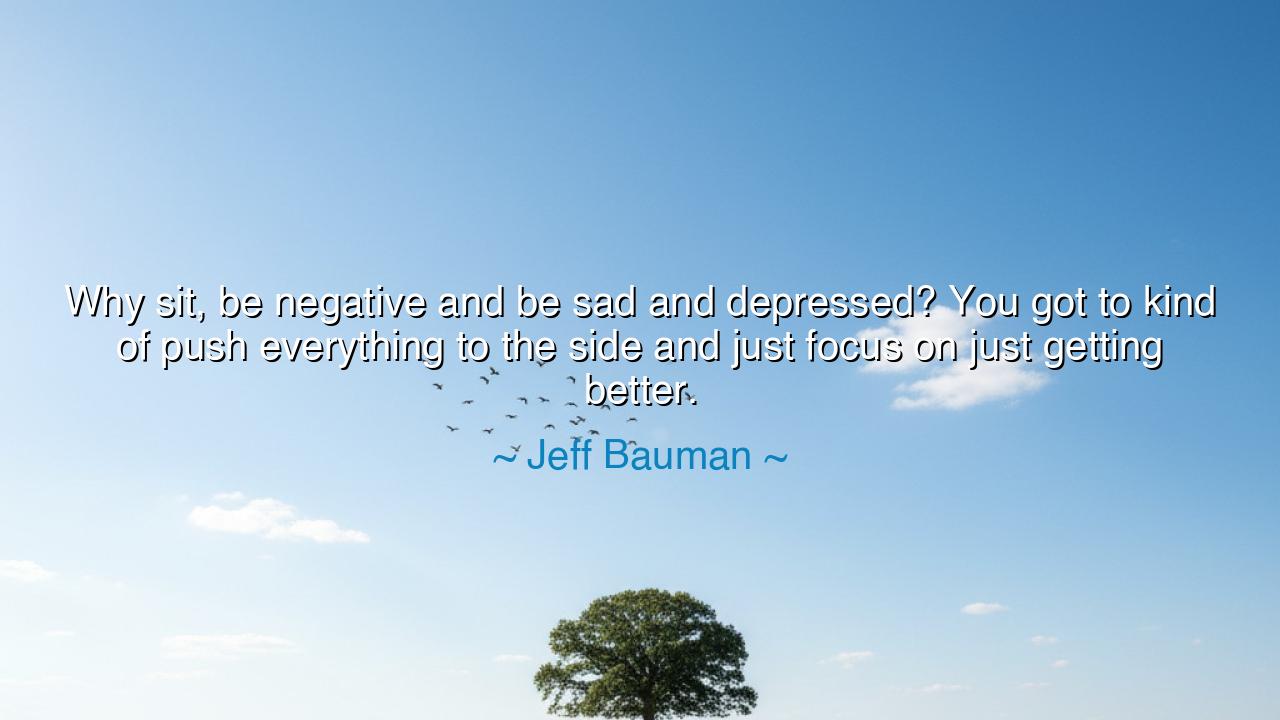
Why sit, be negative and be sad and depressed? You got to kind of
Why sit, be negative and be sad and depressed? You got to kind of push everything to the side and just focus on just getting better.






Hear now, O seekers of endurance, the words of Jeff Bauman, whose life was forged in the fires of unimaginable trial. “Why sit, be negative and be sad and depressed? You got to kind of push everything to the side and just focus on getting better.” In these simple but powerful words lies the wisdom of survival, the call to courage that arises not from ease, but from pain. For Bauman, who lost both his legs in the Boston Marathon bombing, this was no abstract philosophy—it was the cry of a soul determined to rise from the ashes of tragedy and reclaim life’s purpose.
He speaks of the choice of attitude in suffering, the crossroads where despair tempts the weary, yet hope calls the strong. To “push everything to the side” does not mean to deny pain, but to refuse its dominion. It means to stand amid ruins and say, “This will not define me.” In this, Bauman echoes the ancient warriors and stoics who taught that the only true freedom a man possesses is the mastery of his own spirit—the ability to choose courage over surrender, and to seek healing rather than bitterness.
Consider the tale of Admiral James Stockdale, a prisoner of war in Vietnam for over seven years, who endured torture, isolation, and despair. When asked how he survived, he replied that it was not optimism alone, but disciplined hope: the will to confront brutal reality while believing in ultimate triumph. Like Bauman, he did not allow his suffering to consume him; he focused on the daily act of endurance, the small victories that lead toward healing. Both men teach us that resilience is an act of will, not a gift of circumstance.
Bauman’s reflection also unveils the power of focus. Pain fragments the mind, scattering it between regret and fear. But healing demands direction—a gathering of all inner strength toward a single purpose: to get better. This focus is not merely physical but spiritual; it is a choice to rebuild identity, to rise each day despite weakness, and to trust that meaning can emerge from devastation. The ancients called this the discipline of the soul, the act of turning suffering into a crucible for transformation.
Yet within his words lies also humility and humanity. Bauman does not preach from a pedestal of invincibility, but from the ground of experience. His tone is not one of arrogance, but of shared humanity: a reminder that all of us face darkness, and all of us must learn to move forward through pain. To focus on getting better is to trust the process of life, to believe that time and effort can restore not only the body, but the spirit.
From his wisdom arises a timeless lesson: suffering is inevitable, but despair is optional. The human spirit was not made to linger forever in self-pity or paralysis. Even in the face of terrible loss, one must push aside the weight of negativity—not because pain is unreal, but because life still demands to be lived. In this act of will, healing begins. Like the phoenix, the soul rises not in denial of ashes, but through them.
Practical wisdom follows from Bauman’s words. When adversity strikes—be it illness, heartbreak, or failure—focus first on the smallest step toward renewal. Do not surrender to thoughts of “why me,” but ask instead, “what now?” Surround yourself with love, seek meaning in your struggle, and commit to steady progress, no matter how slow. Each day of effort is an act of defiance against despair, each small victory a reclaiming of life.
Thus, let Jeff Bauman’s teaching echo through the generations: do not sit idle beneath the weight of grief. Do not surrender your light to sorrow. Push aside despair and fix your gaze upon recovery. For in every broken body and weary soul lies the power to rise again, to rebuild what was lost, and to prove that the strength of the human spirit is greater than any wound it endures.






AAdministratorAdministrator
Welcome, honored guests. Please leave a comment, we will respond soon